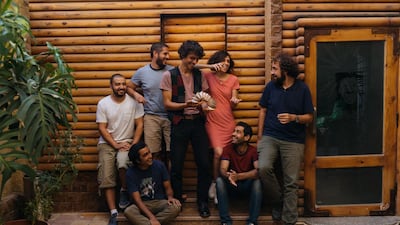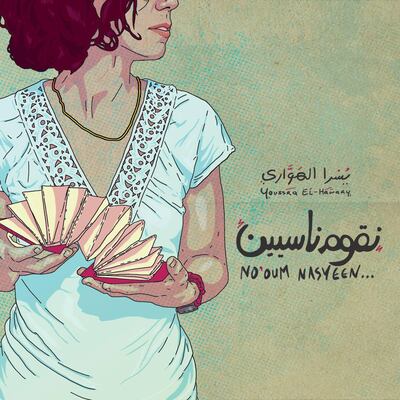On a flight from Beirut to Cairo, sometime around the end of 2011, Youssra El Hawary was offered her first solo gig.
Armed with her accordion and a certain air of on-stage ease, she has since mapped her path as a professional musician, performing in Egypt and abroad. On her first album No'oum Nasyeen (Forgetful We Rise), which was released last month, the 34-year-old is credited with composing all 11 tracks. She also wrote the lyrics to two of the songs, is the project manager, album producer and one of two designers to work on the cover image.
I met Hawary last week at a busy café in downtown Cairo, the city that feeds her creativity. She spoke about journeying from advertising to storytelling and the initial reluctance to drop out of the one which paid the bills. We also discussed the familiarity of performing with friends, the drive behind the album, the chores of management, "of having to be the one that has to keep seven or eight people interested all the time", as well as the hurdles Egypt puts in front of its musicians.
The idea of the album came to Hawary during a trip to France in 2015, her second to the Centre National et International de Musique et d’Accordéon. Prior to that, she had only dabbled professionally with piano after a teacher had told her parents she had an ear for music. “But I wanted [to play] something that I can easily move with. My hand would itch at gatherings when people would just start performing,” she recalled.
In 2006, then a student at the Faculty of Fine Arts, Hawary joined independent theatre troupe Al-Tamy, managed and directed by Salam Yousry who later booked her for her first concert. Through Al-Tamy she met Sedky Sakhr and Shadi El Hosseiny, who both play on No'oum Nasyeen and with whom Hawary has performed regularly for more than a decade.
When she was in France she and longtime friend and bassist Yamen Elgamal wrote to Sakhr and Hosseiny pitching an album to “wrap up the past phase”.
By then, they had performed dozens of songs together – although she continued to go back to performing solo. “I think some songs work better when told as stories,” she says.
With a virtual list of tentative tracks between them, many of which werer already written and composed, Hawary poured her savings into a rigorous schedule of rehearsals and recording sessions, arranging for band members to fly in from Qatar (Khaled Yassine, drums and percussion), Germany (Mido, Irish bouzouki, violin, mandolin), and Belgium (Carl Cappelle, mandola, which is a fifth pitch lower than a mandolin.)
In the summer of 2016, the band spent 12 days tweaking and training at a beach house north of Cairo before hitting the studio, and it was important to leave all distractions behind, explains Hawary. "We even brought along our friend [chef] Omar Marsafy to cook for us," she says, laughing at the fond memory.
The album was eventually recorded live. It was in the middle of their residency on the coast of the Mediterranean that Hawary became intent on launching a crowdfunding campaign to support the production of the album, a first for Egypt.
The operation had its ups and downs, and ultimately the band only collected 51 per cent of the amount requested through Indiegogo. "To cut down on costs, I used to do things myself," Hawary says, which ended up taking its toll on her, both emotionally and physically, to the extent that she briefly spent time in hospital after it was over.
“The fact that we were able to collect [around €13,000 (Dh59,000)] from people who like our music is big.”
The entire album, save for a hidden track, is available free on Soundcloud, a decision Hawary says comes from her conviction that digital sales are never the moneymaker.
Since the launch she has performed three shows in Cairo, accompanied by a changing formation, since half of the members do not live in Egypt.
Aside from the hefty cost of organising a concert for the album release, between taxes, permits, and equipment rental, Hawary says she had to pay a sizable amount to the intellectual property rights authority when she registered the album.
"There's something unreasonable about making 800 Egyptian pounds [Dh165] from a gig," she says, half-dismayed, half-familiar with the shortcomings of Egypt's live music scene, where some venues pay bands a lump sum of 6,000 pounds [Dh1,243] per show. "Somehow, people don't think an artist should be making good money... I am not able to make money off of this project."
Having been a part of the economy of cultural production for close to 10 years, Hawary is no stranger to the setbacks of trying to make ends meet as an artist. She's happy to progress slowly, and admits she could soon need to secure a job with a sustainable income, alongside marketing the album.
The first time I listened to No'oum Nasyeen, which roughly translates to Forgetful We Rise, it wasn't so much about the songs' lyrics as much as it was about the harmonies they were made of. The entire suite felt like a long, playfully-textured tune akin that is akin to the magnetic soundtrack of one of Woody Allen's ode-to-a-city films.
Hawary says the first track, written by friend and poet Mahmoud Ezzat, and from which the album title is derived, was among the songs she was certain would make it to the final list.
Hawary notes that politically, so much is happening that sometimes we tend to forget what is important, she says of our relationship with the news, particularly the type of news we consume through social media.
"Sometimes it [reality] hits us hard that we don't follow up. Why do we forget? Did [a piece of news] mean something and now the meaning is lost, or do we forget because other things keep happening?" Perhaps, human beings caught in post-
revolution develop a tendency to regularly forget by way of coping.
The rest of the songs oscillate between the personal and the collective, whimsically tying Hawary’s penchant for storytelling, and her palpable readiness to remain hopeful, with Egypt’s political and social reality.
__________________
Read more:
Autostrad explain the Jordanian music ethos
Egyptian indie singer and actor Maryam Saleh on her new super group
The poetic licence of Arab indie scene leader Tania Saleh
__________________
One such song is Wana Mashy (On My Way Out). It engages with the notion of leaving, of being absent, its writer, Yousry, who booked Hawary for her first gig, told me recently. They became good friends through Al Tamye and subsequently the Choir Project, a collective that turns group improvisation into short performances. On the album, he is credited for writing three other songs.
Seven years later, I asked him what he saw in Hawary back in 2011. He noted her uniqueness, and said: "Her project was different. She had the ability to tell stories."


